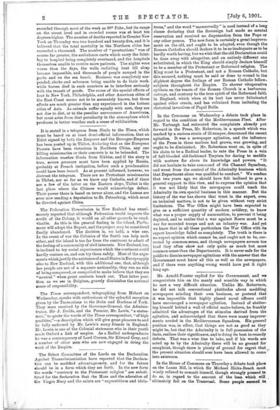In the Commons on Wednesday a debate took place in
regard to the condition of the Mediterranean Fleet. After Mr. Yerburgh had reiterated the complaints already put forward in the Press, Mr. Robertson, in a speech which was marked by a curious strain of ill-temper, denounced the recent agitation. It was a newspaper agitation, and the influence of the Press in these matters had grown, was growing, and ought to be diminished. Mr. Robertson went on, in spite of his claim to be a Radical leader, to rate the Press in a vein of full-blooded old-fashioned Toryism for daring to meddle with matters far above its knowledge and powers. "It did not hesitate to take command of the Channel Squadron, and wrest from the control of the Admiralty business which that Department alone was qualified to conduct." We confess that two years ago we should have felt inclined to give a general support to this view, and to express the opinion that it was not likely that the newspapers could teach the Admiralty its own special business in this manner. But the history of the war has shown that trust in the expert, even on technical matters, is not to be given without very strict limitations. The War Office might have been expected to give us a sufficient quantity of modern artillery, to know what was a proper supply of ammunition, to prevent it being depleted, and to realise that a war against Boers must be a war for mounted troops and not an infantry war. And yet we know that in all these particulars the War Office with its expert knowledge failed us completely. The truth is there is no expert opinion which cannot be, and ought not to be, cor- rected by common-sense, and though newspapers scream too loud they often show not only quite as much but more common-sense than the Departments. It is never safe for the public to dismiss newspaper agitations with the answer that the Government must know all this as well as the newspapers, and if there were anything wrong would have put it right long ago.


















































 Previous page
Previous page